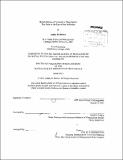Misattribution of arousal in negotiation : the role of the eye of the beholder
Author(s)
Brown, Ashley D. (Ashley Diane)
DownloadFull printable version (3.572Mb)
Alternative title
Role of the eye of the beholder
Other Contributors
Sloan School of Management.
Advisor
Jared R. Curhan.
Terms of use
Metadata
Show full item recordAbstract
This dissertation examines the impact of physiological arousal on negotiation outcomes. Conventional wisdom and extant prescriptive literature suggest that arousal should be minimized, given its assumed negative effect on negotiations. Prior research on the theory of misattribution of arousal, however, suggests that arousal might polarize outcomes-either in a negative or in a positive direction. Across four studies, I manipulate physiological arousal and measure its effect on subjective and objective negotiation outcomes. Results support the polarization effect. When individuals have more negative prior attitudes toward negotiation, arousal has a detrimental effect on outcomes, in part because arousal is construed as negative affect (e.g., nervousness). In contrast, when individuals have more positive prior attitudes toward negotiation, arousal has a beneficial effect on outcomes, in part because arousal is construed as positive affect (e.g., excitement). These findings have important implications for research on negotiation, especially with respect to the influence of emotions. These findings also extend existing research on the theory of misattribution of arousal, which has in the past predominately focused on the target of evaluation, whereas the current research focuses on the critical role of the perceiver.
Description
Thesis (Ph. D.)--Massachusetts Institute of Technology, Sloan School of Management, 2013. Cataloged from PDF version of thesis. Includes bibliographical references (p. 63-71).
Date issued
2013Department
Sloan School of ManagementPublisher
Massachusetts Institute of Technology
Keywords
Sloan School of Management.